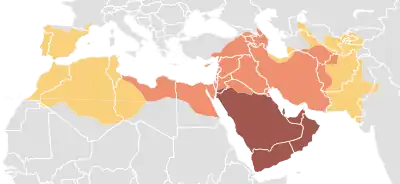Portal:Iraq
The Iraq PortalA view of Baghdad, Iraq
Iraq, officially the Republic of Iraq, is a country in Western Asia. It is bordered by Turkey to the north, Iran to the east, the Persian Gulf and Kuwait to the southeast, Saudi Arabia to the south, Jordan to the southwest and Syria to the west. The capital and largest city is Baghdad. Iraq is home to diverse ethnic groups; mostly Arabs, as well as Kurds, Turkmen, Assyrians, Armenians, Yazidis, Mandaeans, Persians and Shabakis with similarly diverse geography and wildlife. Most Iraqis are Muslims – minority faiths include Christianity, Yazidism, Mandaeism, Yarsanism and Zoroastrianism. The official languages of Iraq are Arabic and Kurdish; others also recognised in specific regions are Suret (Assyrian), Turkish (Turkmen) and Armenian. Modern Iraq dates back to 1920, when the British Mandate for Mesopotamia, joining three Ottoman vilayets, was created under the authority of the League of Nations. A British-backed Kingdom was established in 1921 under Faisal I of Iraq. The Hashemite Kingdom of Iraq gained independence from the UK in 1932. In 1958, the monarchy was overthrown and the Iraqi Republic created. Iraq was controlled by the Arab Socialist Ba'ath Party from 1968 until 2003. In 1980, Iraq invaded Iran, sparking a protracted war which would last for almost eight years, and end in a stalemate with devastating losses for both countries. After an invasion by the United States and its allies in 2003, Saddam Hussein's Ba'ath Party was removed from power, and multi-party parliamentary elections were held in 2005. The US presence in Iraq ended in 2011. Iraq is considered an emerging middle power with a strategic location and a founding member of the United Nations, the OPEC as well as of the Arab League, OIC, Non-Aligned Movement and the IMF. From 1920 to 2005 Iraq experienced spells of significant economic and military growth and briefer instability including wars. (Full article...) Selected article -Assyrian may refer to:
Selected picture
Date palm orchards in Babylon Did you know...
Selected biography -
Abū Isḥāq Muḥammad ibn Hārūn al-Rashīd (Arabic: أبو إسحاق محمد بن هارون الرشيد; October 796 – 5 January 842), better known by his regnal name al-Muʿtaṣim biʾllāh (المعتصم بالله, lit. 'He who seeks refuge in God'), was the eighth Abbasid caliph, ruling from 833 until his death in 842. A younger son of Caliph Harun al-Rashid (r. 786–809), he rose to prominence through his formation of a private army composed predominantly of Turkic slave-soldiers (ghilmān, sing. ghulām). This proved useful to his half-brother, Caliph al-Ma'mun, who employed al-Mu'tasim and his Turkish guard to counterbalance other powerful interest groups in the state, as well as employing them in campaigns against rebels and the Byzantine Empire. When al-Ma'mun died unexpectedly on campaign in August 833, al-Mu'tasim was thus well placed to succeed him, overriding the claims of al-Ma'mun's son al-Abbas. Al-Mu'tasim continued many of his brother's policies, such as the partnership with the Tahirids, who governed Khurasan and Baghdad on behalf of the Abbasids. With the support of the powerful chief qādī, Ahmad ibn Abi Duwad, he continued to implement the rationalist Islamic doctrine of Mu'tazilism and the persecution of its opponents through the inquisition (miḥna). Although not personally interested in literary pursuits, al-Mu'tasim also nurtured the scientific renaissance begun under al-Ma'mun. In other ways, his reign marks a departure and a watershed moment in Islamic history, with the creation of a new regime centred on the military, and particularly his Turkish guard. In 836, a new capital was established at Samarra to symbolize this new regime and remove it from the restive populace of Baghdad. The power of the caliphal government was increased by centralizing measures that reduced the power of provincial governors in favour of a small group of senior civil and military officials in Samarra, and the fiscal apparatus of the state was more and more dedicated to the maintenance of the professional army, which was dominated by Turks. The Arab and Iranian elites that had played a major role in the early period of the Abbasid state were increasingly marginalized, and an abortive conspiracy against al-Mu'tasim in favour of al-Abbas in 838 resulted in a widespread purge of their ranks. This strengthened the position of the Turks and their principal leaders, Ashinas, Wasif, Itakh, and Bugha. Another prominent member of al-Mu'tasim's inner circle, the prince of Ushrusana, al-Afshin, fell afoul of his enemies at court and was overthrown and killed in 840/1. The rise of the Turks would eventually result in the troubles of the 'Anarchy at Samarra' and lead to the collapse of Abbasid power in the mid-10th century, but the ghulām-based system inaugurated by al-Mu'tasim would be widely adopted throughout the Muslim world. (Full article...)
General imagesThe following are images from various Iraq-related articles on Wikipedia.
ListsTopicsCategoriesCategory puzzle Select [►] to view subcategories
Iraq Iraq-related lists Annual events in Iraq Iraqi culture Economy of Iraq Education in Iraq Geography of Iraq Government of Iraq Health in Iraq History of Iraq Organizations based in Iraq Iraqi people Politics of Iraq Society of Iraq Images of Iraq Iraq stubs Related portalsWikiProjects
Things you can do
Associated WikimediaThe following Wikimedia Foundation sister projects provide more on this subject:
Discover Wikipedia using portals
| ||||||||||
.jpg.webp)


.svg.png.webp)


.jpg.webp)













.svg.png.webp)









.jpg.webp)









